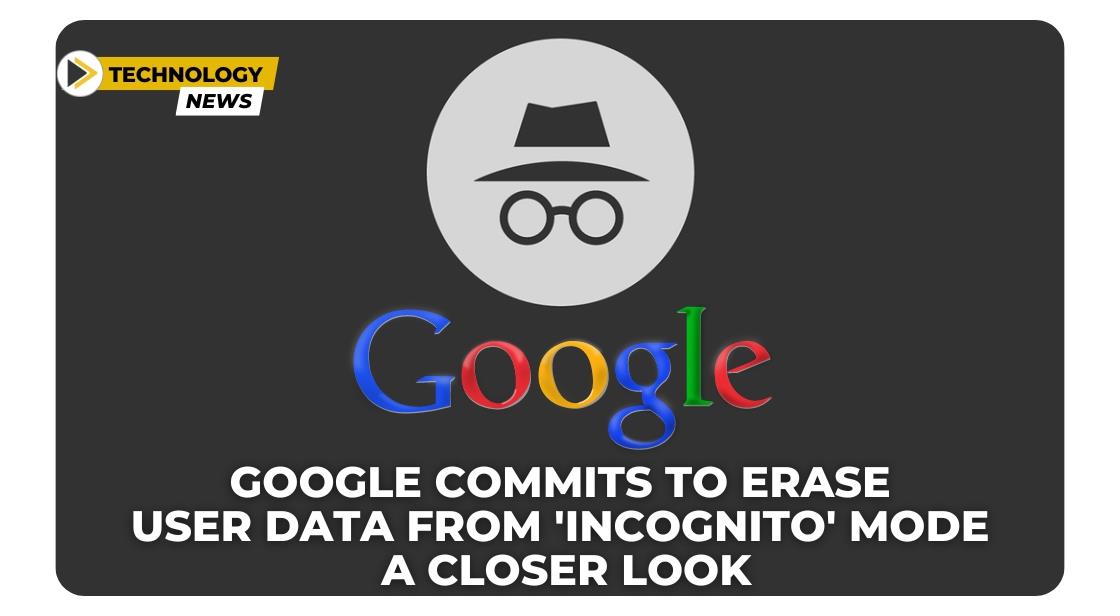Google Commits to Erase User Data from 'Incognito' Mode: A Closer Look

News Synopsis
In a significant development, tech giant Google has agreed to delete millions of user data records collected through its Chrome browser's 'Incognito' mode. This decision stems from a class-action lawsuit filed in 2020, alleging Google's covert monitoring of web activity and data collection from users who believed their browsing was anonymous.
Incognito Mode Lawsuit:
The lawsuit accused Google of utilizing the information gathered from 'Incognito' mode for assessing web traffic and targeting advertisements without users' consent. It highlighted concerns regarding user privacy and transparency in Google's operations.
The Incognito Controversy: Browsing Privately, or Not?
The lawsuit alleged that Google continued to track user activity in Incognito mode, despite assurances that browsing history wouldn't be saved. Plaintiffs argued this data was used for analyzing web traffic and ad targeting.
User Privacy Concerns
-
"Unaccountable Trove of Information": Lawyers for the plaintiffs depicted Google as amassing a vast amount of user data, exceeding what users could have anticipated.
-
Discrepancy Between Marketing and Reality: The lawsuit highlights a potential disconnect between Google's marketing of Incognito mode as entirely private and the reality of ongoing data collection.
Internal Doubts at Google
Leaked internal communications reveal that even Google employees questioned the company's practices. Some engineers suggested changing the Incognito mode name and icon to better reflect its limitations.
Marketing Head Acknowledges Lack of Transparency
An email from a Google marketing executive highlighted concerns about the company's messaging around Incognito mode. The message concedes that the mode wasn't truly private, requiring misleading marketing language.
Settlement Terms and Moving Forward
The settlement requires Google to:
-
Disclose Data Tracking in Incognito Mode: Google must now be transparent about its ability to track browsing activity even in Incognito mode.
-
Block Third-Party Tracking Cookies: By default, Google Chrome will prevent third-party companies from placing tracking cookies while users are in Incognito mode.
What it Means for Users
-
Increased Transparency: Users will have a clearer understanding of the limitations of Incognito mode.
-
Enhanced Privacy: Blocking third-party cookies by default offers users more control over their data in Incognito mode.
-
No Monetary Damages: The settlement doesn't award individual users any financial compensation.
Google's Stance
Google maintains they are deleting "old technical data" not linked to individual users and not used for personalization. The company emphasizes avoiding a lengthy trial through this settlement.
Google's Response:
Google spokesperson Jose Castaneda expressed the company's willingness to delete old technical data unrelated to individuals and not used for personalization. However, no monetary damages will be awarded to class members as part of the settlement agreement.
Final Approval Pending:
The settlement awaits final approval from US District Judge Yvonne Gonzalez Rogers, potentially avoiding a lengthy and costly trial while addressing concerns raised by the class-action lawsuit.
Conclusion: A Turning Point for Incognito Mode Transparency?
The Google Incognito mode lawsuit settlement marks a potential turning point for user privacy and transparency. While it doesn't offer financial compensation to individual users, it compels Google to be more upfront about data collection practices. Disclosing tracking capabilities and blocking third-party cookies by default in Incognito mode are significant steps towards user empowerment.
However, questions remain. The settlement doesn't address the broader issue of data collection beyond Incognito mode, and the effectiveness of the settlement's measures in safeguarding user privacy requires monitoring.
This lawsuit serves as a reminder for users to be vigilant about their online privacy and explore alternative browsers or privacy-focused extensions if desired. It also highlights the ongoing tension between user privacy expectations and the data-driven advertising model that fuels many tech giants.
You May Like









